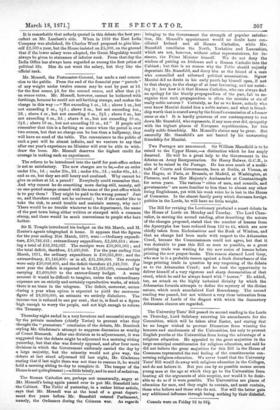Sir R. Temple introduced his budget on the 8th March,
and M. Ileuter's agents telegraphed it home. It appears that the figures -for the year ending 31st March, 1870, were :—Ordinary expendi- ture, £50,782,413; extraordinary expenditure, £2,599,614; show- ing a total of £53,382,027. The receipts were £50,901,081; and the total deficit, therefore, 12,480,916. For the year ending 31st March, 1871, the ordinary expenditure is £50,051,800; and the extraordinary, £1,146,800; or in all, £51,198,000. The receipts were only 250,018,900, and the deficit therefore 21,149,700. For next year the deficit is expected to be £3,533,000, concealed by -carrying £3,600,000 to the extraordinary budget. A worse account it would be difficult to imagine, unless the extraordinary -expenses are on strictly and certainly reproductive works, of which there is no trace in the telegram. The deficit, moreover, occurs -during a year when opium is expected to yield the enormous Egure of £8,000,000, an estimate we entirely disbelieve. The Income-tax is reduced to one per cent., that is, is fixed at a figure '-'high enough to worry the people, and not high enough to relieve the Treasury.


































 Previous page
Previous page